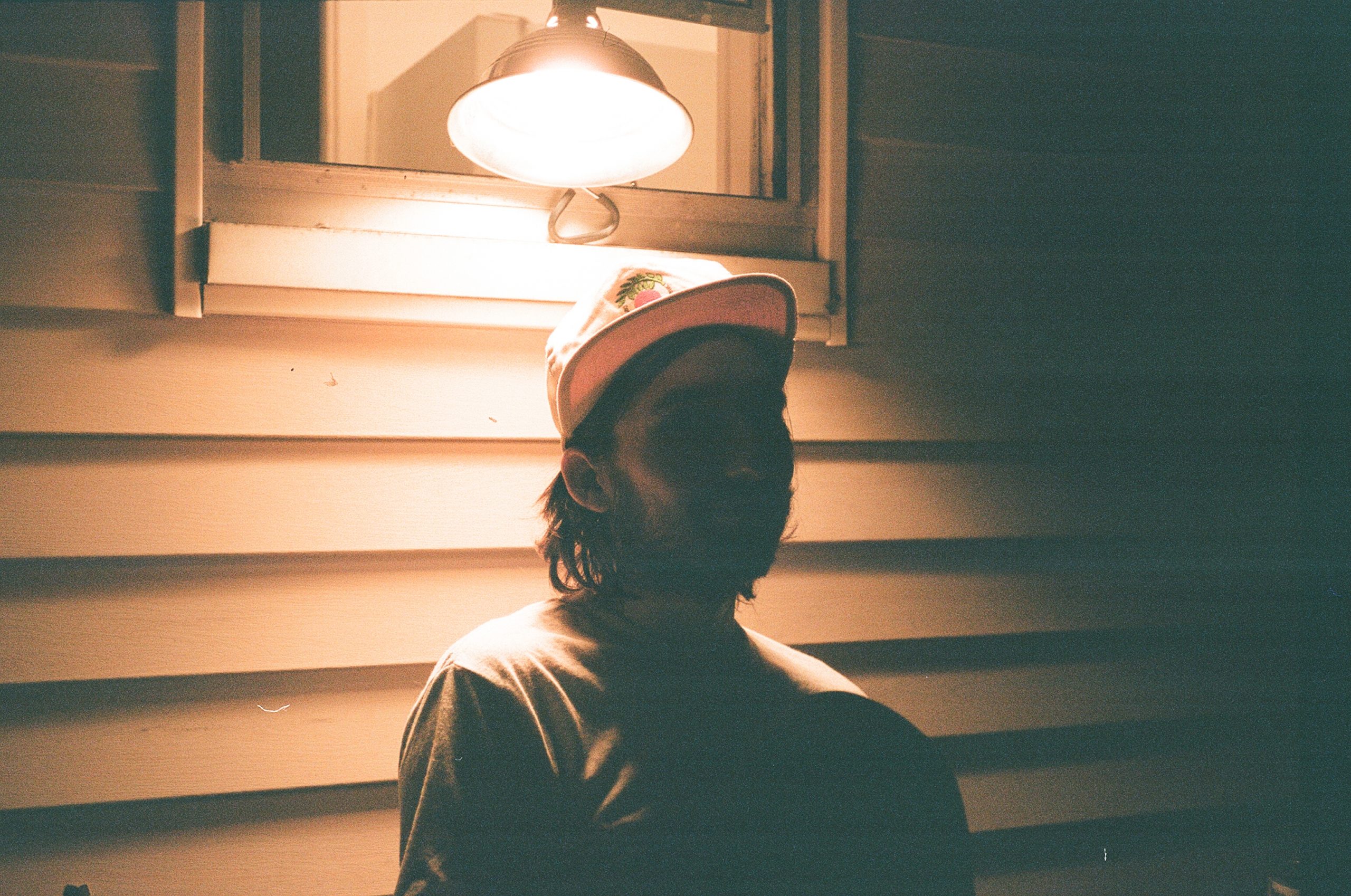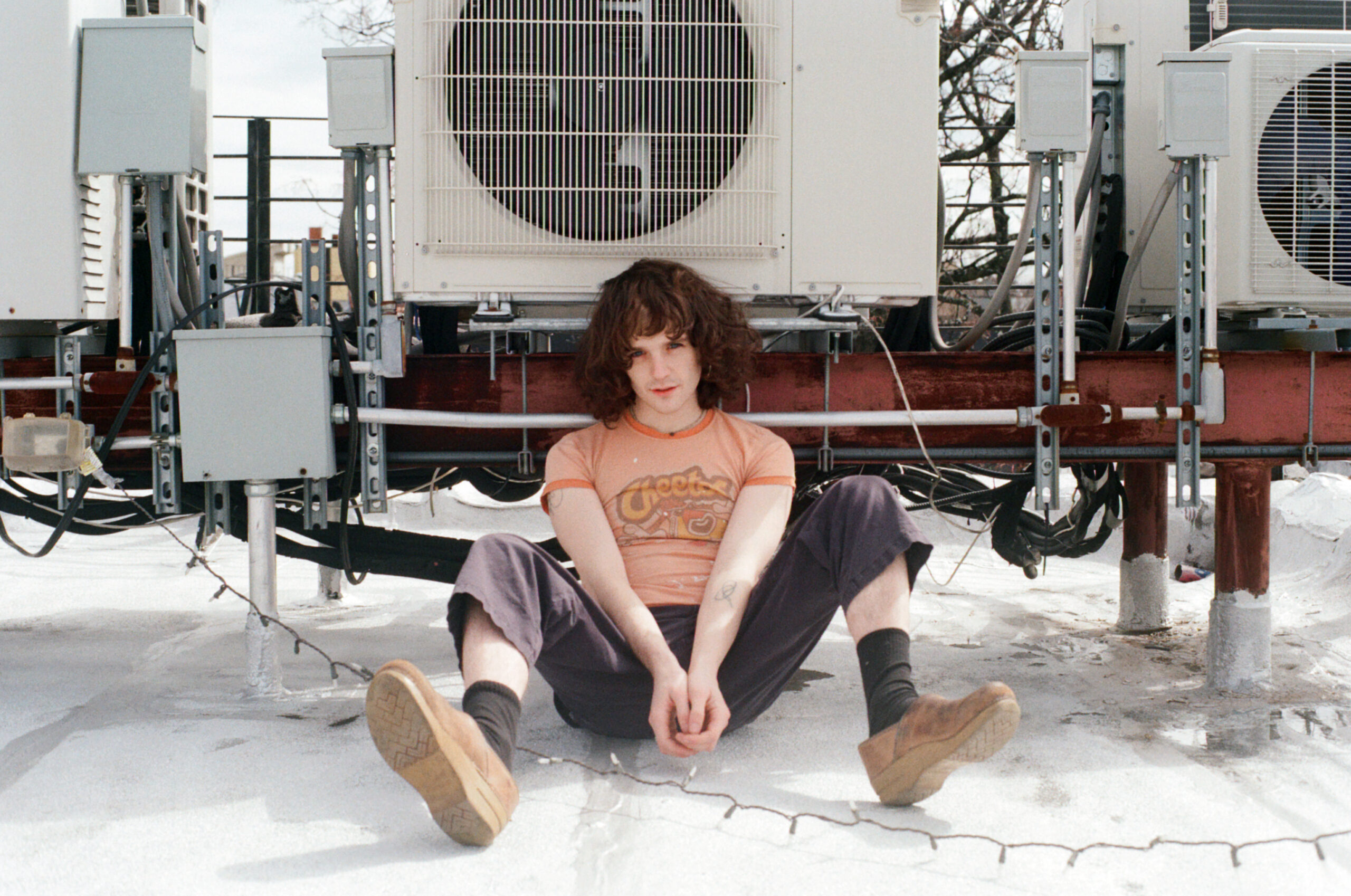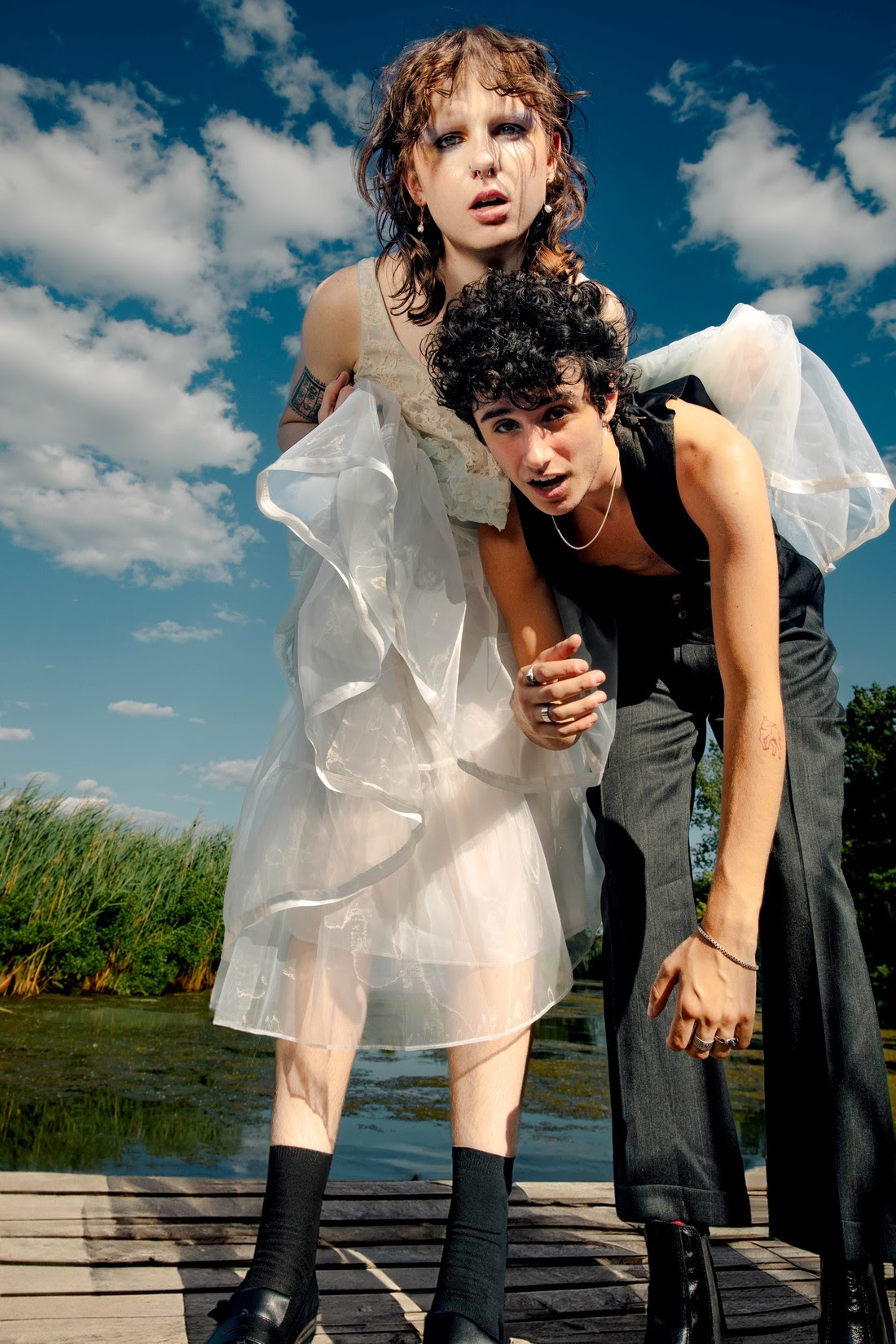Love's Crushing Diamond, the first full-length release after many EPs and singles from Mutual Benefit, is the sort of elegaic celestial symphony-in-miniature that fans of Youth Lagoon, Sufjan Stevens, Mercury Rev, the Microphones, and Radiohead's "Motion Picture Soundtrack" will adore. The record's seven song-suites somehow sound like intimate cuddling and expansive world-building at once. As ever, it's the creative outpouring of Jordan Lee, an itinerant 25-year-old whose journey spans from suburban Ohio to Austin, Boston, St. Louis and Brooklyn.
Lee's been grabbing a lot of attention in the months since we first posted single "Advanced Falconry" in July. Increasing online buzz and stunning performances like the band's CMJ showcase ensured that when the new Brooklyn micro-label Soft Eyes Records released Love's Crushing Diamond this fall, demand far outstripped the limited supply. So Other Music Recording Co., the label affiliated with the legendary East Village record store Other Music, is reissuing the LP on 12/3.
In the meantime, Lee is transitioning from Boston to Brooklyn, working on songs for the next Mutual Benefit release and grappling with his music's sudden transformation from passion project to career. I caught up with him earlier this afternoon to discuss his wanderlust, the suffering among friends that inspired Love's Crushing Diamond, the serendipity that has always spurred Mutual Benefit along, and much more.
STEREOGUM: How are you?
JORDAN LEE: I'm a little nervous; this is my first phone interview, so you have to go easy on me.
STEREOGUM: Haha, will do. I noticed on Bandcamp that your discography as Mutual Benefit goes back to about '09. Were there any projects before that? What was your musical history before that?
LEE: Yeah, well if you wanna go way, way back, I was definitely in some pop punk bands in high school. But to get a little closer to what I'm doing now, I was making pop music under my own name probably since I was 17 or so. It was pretty straightforward, verse, chorus, bridge kinda stuff. I was really inspired by stuff like Elliott Smith where I could -- I forget what record "Speed Trials" was on, but I remember hearing that song and being like, "Oh whoa, I can record music that's like his voice doubled and acoustic guitar and drums and that's it." So I started kinda making songs like that. And it wasn't until I moved to Texas right after high school that I guess I got into more like noise stuff and I fried my brain a little bit with psychedelics and, I don't know, I just kinda stopped trying to make traditional pop music and got more interested in using field recordings and making non-traditional sounds, maybe running signals through a broken karaoke machine or something like that instead of guitar-based stuff.
STEREOGUM: You mentioned moving to Texas, but I noticed your phone number is an Ohio number. Did you grow up in Ohio?
LEE: I did! Yeah, I grew up in a suburb of Columbus. Somewhere that is totally unremarkable in almost every way.
STEREOGUM: Yeah, I actually grew up in the suburbs of Columbus as well.
LEE: Oh really, which one?
STEREOGUM: I actually still live in Columbus, believe it or not, I grew up in Westerville.
LEE: Oh damn! I grew up in Pickerington.
STEREOGUM: I ran some cross country meets in Pickerington.
LEE: You know, I really do think that Ohio breeds some really interesting people. When I'm traveling around it's like, if I meet someone great, they're also from Ohio.
STEREOGUM: Awesome. So you moved to Texas after high school and eventually you ended up in Boston, right?
LEE: Mmhmm.
STEREOGUM: Is that where Mutual Benefit got started?
LEE: Yeah, well, Mutual Benefit started as a recording project in Texas, but it definitely -- I very deliberately moved to Boston to meet up with some musicians I had really been wanting to play with and that's where it became more of a real thing where we played live. Yeah, one of my Ohio friends I grew up with and we played together for years, he went to Berklee and I moved to Texas, and we made a deal that once he graduated, we would meet up again and try to do this for real.
STEREOGUM: That reminds me: Does the band have a fixed lineup? Is it a more fluid lineup? How does that work?
LEE: Oh yeah, it's very fluid. At this point I can do a solo set if I need to and I can use loops and samples and all of that, but I'd much prefer to have a group of people to play with. It really, at this point, has been really circumstantial. When I first moved to Boston, I was kinda living like a crust punk and sleeping on the floors of rehearsal spaces and couches and kinda trying to get my bearings. And so stuff as silly as -- I didn't even have an amp -- and so the lineups would just kinda be like, "Who's around? Who has a space to play? Who can take off work to go on a two week tour?" And so sometimes we'd have a drummer, sometimes we wouldn't. And yeah, it's kinda fun to try to adapt to the environment. It's a real growing experience.
STEREOGUM: Are you still based in Boston? I know your Bandcamp says some stuff about Brooklyn. Are you back and forth?
LEE: Yeah, for the time being I'm back and forth. I've lived in Boston for about three years, and this September I decided not to resign my lease because I feel like Brooklyn's kinda like a black hole, it's just sucking me that direction. So I'll probably be based out of there as soon as I can save up for a security deposit. But yeah, it's hard for me to stay in one spot for longer than a couple of months without getting the itch to bounce around.
STEREOGUM: I guess that probably lends itself to touring pretty well.
LEE: Yeah, absolutely. I think there's a certain head space that you get in while you tour where you're meeting new people and you're having a new experiences every day. It kinda shakes off any mindless habits that you have, and it forces you to be in the present, and I think that I've gotten addicted to that feeling. [laughter] I wish I could figure out how to do it and have a steady life somehow, but as of now I have to be on the road for a quarter of the year.
STEREOGUM: So, your new record -- would you consider this your first full-length record? I know they're all kind of different lengths.
LEE: Yeah, I guess labels aren't super important to me, but I feel like it's a complete thought. And I know that it borders on the short side to be a full-length, but I would consider it a full-length record.
STEREOGUM: So when you say it's a complete thought, what were you thinking about? What inspired the record?
LEE: Well, the project started either late 2011 or early 2012. I had been on the road a lot, and I was really into field recording. So I really liked recording jams, or if we were at a house with a piano, recording the piano or the windchime on the porch and trying to keep my ears open to things that would be cool to manipulate or loop. So it didn't really have the thematic idea yet, but I guess some people that were close to me were really struggling with heavy stuff and it's more so than I'd ever had to deal with before where I'm kind of powerless watching people that I love being hurt. And so that was on my mind a lot, to the point where it was hard to feel good about things, you know? Hard to be excited to be in this world. And so, there was a friend who I grew up with, another Ohio friend, who offered me a cheap room in St. Louis for as long as I needed it. So I kind of bounced out of Boston and hung out in St. Louis and worked on writing a lot of music and writing down my thoughts, and that's kinda how the album came about. It's funny to me, and interesting that people are excited to listen to it -- at least some people are. Because to me it was almost 100 percent therapeutic. It was just like, "I gotta get this thing off my chest, and then I'm gonna understand how to feel." And so now, I'm really proud of it in that sense. Basically the conclusion I came to that I hope is conveyed through the record is that there are gonna be seasons of devastation that happen in your life, and for me, the only way to get through it was to stop thinking about things in binary terms of whether they're good or bad. It's a really elementary Buddhist thought: It just is, this is what's happening and that's it. So I think the record's a lot about -- not giving up, but just letting go. It kind of goes back to the idea of fluidity. I used to intern at a recording studio in Austin, Texas, so after a lot of it was written in St. Louis, I spent time in Texas adding a lot of layers and synthesizers and stuff like that. And then I finished it up in Boston and felt kind of a weight lifted off of me. So I really don't know what the next record is gonna be. It kind of started the same way where I have a lot of sounds that I've recorded that I'm excited about, but I haven't figured out how to put them together yet.
STEREOGUM: How long has this one been done?
LEE: It's been finished ... I think it's only a couple months old.
STEREOGUM: It's cool to have a quick turnaround. I know so many bands when they get into a label system they end up having to wait six months or more to release their album after it's done.
LEE: Oh yeah, no, this one was really backwards. I had no expectations for -- I guess once you work on a thing for long enough, you don't know if it's good anymore. And so to me, it was such a selfish endeavor -- I need to make this myself. So Cory and Marc, my two really good friends in Brooklyn who play in Lizard Kisses, they started up a small label called Soft Eyes and said that they would release my record the minute it was done. So that's what I did, and basically it got more attention than any of us were expecting. So basically it made more sense to do the repressing through a bigger label that had the infrastructure to support a lot of people trying to buy it. 'Cause even trying to ship 200 LPs is super overwhelming, especially since I don't have a permanent home right now. So totally backwards. I'm sure the label wishes that I hadn't released it so they could've done a regular hype-cycle and done a couple singles and stuff like that, but it's out!
STEREOGUM: What's the other label that's putting it out?
LEE: It's called Other Music Recording Company.
STEREOGUM: Based out of the store in New York?
LEE: Yeah yeah, I'm actually really psyched to work with them. I guess I've been really cautious about stepping into kind of some more traditional label kind of things because it's been really fulfilling the past couple of years to fly under the radar and play for 30 or 40 people in a living room or basement and kind of feel like I'm connected and friends with all of them at the end of the night. It's a lot different of an experience to be marketed, and play for a couple hundred people and, you know, not have a connection with them. And so the last couple of weeks have been a little stressful where it's like, "What do I want to be doing?" It's cool because it's a lot more sustainable of a lifestyle to do it this way financially, but it's also pretty tricky to mix the thing that makes you happy with the thing that's paying your bills.
STEREOGUM: Certainly.
LEE: But I'm happy to be working with them as opposed to other indie labels because half of what they've put out so far has been not in English. They did a really cool neo-classical Swedish chamber pop record, I don't even know what to call it! And a Brazilian psych-rock record. And so at least out the gate I won't be pigeonholed as some new-Americana kind of thing. [laughter] I'll stay unclassifiable for a while.
STEREOGUM: I heard that Brazilian band and otherwise I knew that Nude Beach record came out on Other Music, but I didn't know what else was out there.
LEE: Yeah, I think they've only worked with five or six bands so far. Still a pretty new label.
STEREOGUM: You mentioned field recording and that sorta thing. Is some of the sound on Love's Crushing Diamond a product of field recording?
LEE: Oh, absolutely, yeah. For instance, the song "Golden Weight," that sort of drum machine sound in the background was -- I was staying at a house and they had this super cool organ, so I recorded some sounds on the organ with the microphone really far away and then wrote the rest of the song on top of that. That was kind of a breakthrough moment for me because somehow the mixing of a lo-fi room-based sound with close-mic overdubs made the aesthetic really interesting to me. Also the piano riff on "That Light That's Blinding" was something that we made after a show in Ann Arbor, Michigan. We just played this 20-minute stoned jam and that one little moment in there was really beautiful to me, so I wrote something on top of that.
STEREOGUM: Is there anything I haven't asked that seems like it would be important to talk about?
LEE: Well, something I guess that's interesting to me is that since Mutual Benefit started I feel like a lot of it has been -- maybe cosmic is the right word. I haven't had a lot of ambition, but just a lot of little things happened that have been really helpful. Even for this record, I've always dreamt of having string sections in my songs but had never been able to afford to set any of that up. And Jake, who plays violin throughout the whole album, was a friend of a friend -- actually, a friend from Japan. Jake came into my life through touring, and he bounces around between California and New York. I think he settled in Brooklyn now. But when I was living in St. Louis, I recorded all the string parts on a Casio keyboard on the violin setting, and I was pretty happy with it. But Jake for some reason was in Missouri, I think to visit a cousin or something like that, but it just happened to work out that he could take a Greyhound to St. Louis where I was staying, and in a few days, he knocked out all the string parts on the whole album. We worked sun up to sundown. And if it hadn't have been for that little trip, this album would've been totally different. There's little things like that throughout the whole career of Mutual Benefit that makes me really hopeful that if you kind of keep your mind open and you try to be on the right path it seems like that will happen and kind of encourage you to do the right thing.
STEREOGUM: Cool story! Thanks for sharing that.
LEE: And I guess one other thing I'd like to add is that I've been trying to do this for the last couple of years, but it's just been playing DIY shows and, you know, sometimes only playing for the five people that live at the house. So I guess in the last couple of weeks I feel a shift happening. But I've been super grateful for the past couple of years. And in that same train of thought as before, there's definitely been moments where we've had a couple of bad shows in a row and we're not 100 percent sure how we're going to pay for gas to get to the next spot and something always happens. We'll play at a show and some guy looks out of place in a polo shirt and is like so moved and will pay $50 for a CD and just wants to make sure we're set up for the next town. And I think there's something about putting yourself out there or like, just like, things often work out. I guess I'm reiterating the same thoughts as before, but we have a strange history of coincidences like that.
STEREOGUM: Well, I hope they keep coming.
LEE: They seem to be not in short supply lately.
[Photo by Ali Carter]






